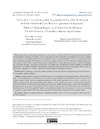Please use this identifier to cite or link to this item:
https://accedacris.ulpgc.es/jspui/handle/10553/74402
| Title: | Efecto de una capacitación sobre los puntajes de la prueba de admisión de la Universidad de Costa Rica: una aproximación bayesiana | Other Titles: | Effects of a Training Program on the Scores from the Admission Test at the University of Costa Rica: a Bayesian Approximation | Authors: | Montero Rojas, Eiliana Rojas-Rojas, Guaner Francis-Salazar, Susan Negrin-Hernandez, Miguel |
UNESCO Clasification: | 611402 Actitudes 610402 Métodos educativos 611408 Procesos y teoría de la decisión |
Keywords: | Prior Distributions Multilevel Models Test-Wiseness Skills Impact Evaluation, et al |
Issue Date: | 2015 | Journal: | Actualidades En Psicologia | Abstract: | A quasi-experimental design with pre and post-test was used to estimate training effects for the University of Costa Rica's admission test, a standardized exam that measures reasoning abilities in mathematical and verbal contexts. Four secondary public schools from the metropolitan central area of the country participated in the study; two of them were randomly assigned to the intervention group and the other two to the control group, with 61 students in the first group and 80 in the second. The intervention consisted of five three-hour training sessions, using a written guide developed by a pedagogy expert with a constructivist approach. Before and after measures were reduced test forms of the real admission test from the year 2014. The dependent variable was the difference between the two measures. The effect of the training was estimated using a multilevel Bayesian regression model with a significant magnitude of 3.5 percentage points. Se usó un diseño cuasi-experimental con pre y post-test para estimar el efecto de una capacitación para la prueba de admisión de la Universidad Costa Rica, un test estandarizado que mide habilidades de razonamiento en contextos verbales y matemáticos. Cuatro colegios públicos del área metropolitana central del país participaron en el estudio, asignándose dos de ellos aleatoriamente al grupo de intervención y los otros dos al grupo de control, con 61 estudiantes en el primer grupo y 80 en el segundo. La intervención consistió de 5 sesiones de capacitación de 3 horas, utilizando como guía un manual desarrollado por una experta pedagoga, con enfoque constructivista. Las medidas antes y después fueron formas reducidas de la prueba de admisión 2014. La variable dependiente fue la diferencia entre ambas mediciones. El efecto de la capacitación fue de 3.5 puntos porcentuales y significativo, y se estimó utilizando un modelo bayesiano de regresión multinivel. |
URI: | https://accedacris.ulpgc.es/handle/10553/74402 | ISSN: | 0258-6444 | DOI: | 10.15517/ap.v29i119.19283 | Source: | Actualidades en Psicologia [ISSN 0258-6444],v. 29 (119), p. 115-130, (2015) |
| Appears in Collections: | Artículos |
Page view(s)
234
checked on Jan 16, 2026
Download(s)
119
checked on Jan 16, 2026
Google ScholarTM
Check
Altmetric
Share
Export metadata
Items in accedaCRIS are protected by copyright, with all rights reserved, unless otherwise indicated.
